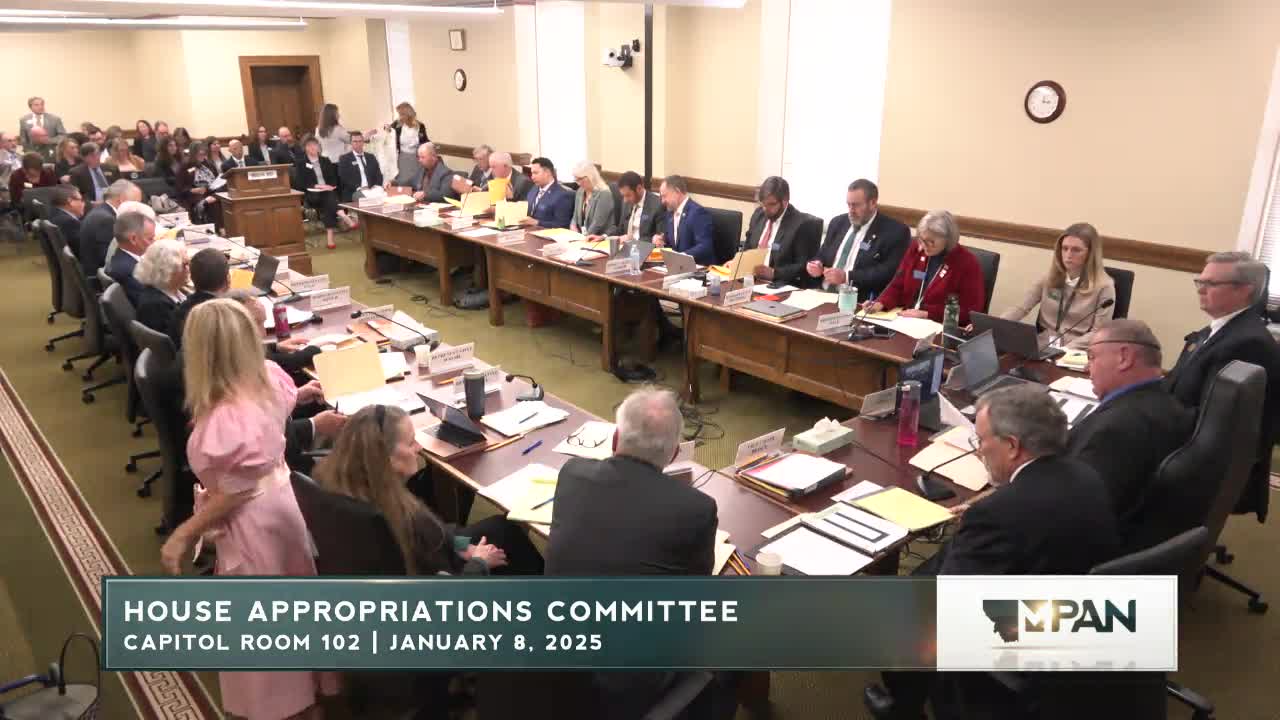Committee hears House Bill 4, seeks details on long-running federal grant carryovers and ARPA interest authority
Get AI-powered insights, summaries, and transcripts
Subscribe
Summary
House Bill 4 would authorize continuation of budget-amendment spending authority—primarily federal grants—and includes a large projected appropriation for ARPA interest; the committee asked agencies for carryover and expenditure details and requested written follow-ups.
HELENA — The House Appropriations Committee held an informational hearing on House Bill 4 on Tuesday, which would authorize continuation of one-time spending authority and budget amendments (primarily federal grants) into the next federal fiscal years; lawmakers requested further documentation on several long-standing and large items, including interest earned on ARPA funds.
Why it matters: House Bill 4 provides appropriation authority for one-time grants and federal awards that agencies have received or expect to receive while the legislature is in session. Committee members said they want clearer breakdowns of what remains unspent and what will continue to be expended beyond the current fiscal year.
What presenters said Evelyn Davis of the Office of Budget and Program Planning told the committee that budget amendments are governed by state law in Title 17 and are intended to provide one-time spending authority mainly for federal funds that are not part of the base budget for the next biennium. “Budget amendments provide one-time spending authority primarily for federal funds,” Davis said.
ARPA interest and other large items Committee members focused substantial attention on a large line in the fiscal note described as ARPA interest. Arlyn Lantz from the governor’s office said the appropriation reflects interest earned on ARPA funds and that the executive branch projected an appropriation of roughly $101,000,000 for ARPA interest through 2027; another witness said about $92,000,000 appears in the current fiscal note and that “all but about $3,600,000” of the appropriation is ARPA interest. Committee members requested a detailed accounting of how interest has been spent to date and planned uses for future expenditures.
Long-running federal grants and carryover Representative questions covered several budget-amendment entries that span multiple federal fiscal years. Members asked for up-to-date remaining balances and program descriptions for items including the state crisis intervention program formula solicitation, multiple DEQ nonpoint-source project grants (covering earlier federal fiscal years), Brand Montana ARPA travel/tourism grants, and other continuing authorities. Davis agreed to provide agency-level remaining balances and program descriptions; she and committee staff committed to deliver that information in writing (committee asked for many data points by noon the next day and suggested a broader set of documentation by the end of January for items that are not time-sensitive).
Process and statutory authority Committee staff and witnesses referenced the statutory process that authorizes budget amendments when the legislature is not in session (Title 17, Chapter 7, Part 4). Committee members pressed the budget office to clarify why some longstanding programs appear as budget amendments rather than base-budget items; Davis explained these are existing appropriations that are being continued under the statute and that the committee’s approval in House Bill 4 extends authority into the listed federal fiscal years.
No executive action The committee did not take executive action on House Bill 4 at Tuesday’s hearing. Davis and other witnesses agreed to provide the requested financial detail and breakout columns (state vs. federal funding) for the agencies listed in the fiscal note.
Ending Chair and members emphasized that the committee will review the written follow-up and that additional amendments or adjustments could be proposed before the bill moves forward.
